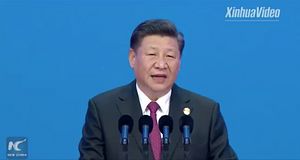On Tuesday morning, Chinese President Xi Jinping addressed the 2018 Boao Forum for Asia in Hainan, which runs through Wednesday. Xi’s speech was highly anticipated as it came after days of tit-for-tat punitive measures on trade by the United States and China. Over the course of his speech, Xi addressed a range of topics, including China’s view on regional security in Asia, its plans for trade and investment liberalization, and the meaning of the Belt and Road Initiative—Xi’s signature foreign policy undertaking.
Significantly, Xi, about two-thirds of the way into his address, turned to address concerns voiced by U.S. President Donald Trump—albeit indirectly, without mentioning either the United States or Trump by name. Xi said that China was eager to increase its imports and would be “significantly” lowering its tariffs on imported vehicles and other products.
Xi’s choice of vehicles as a specific product class was telling as a message to Trump; the U.S. president used precisely the example of Chinese tariffs on cars in voicing his grievances about Chinese trade practices. (Trump’s tweet bemoaning Chinese car tariffs was posted the same day as Xi’s speech.)
But despite these seeming concessions, Xi did not address core themes in China’s ongoing economic planning, including the Made in China 2025 initiative, which will make delivering on the promises of increasing imports more difficult. And the gesture toward reducing tariffs didn’t come cost-free: Xi clearly signaled that he expected Western countries to allow Chinese investment unimpeded access to sensitive high technology sectors.
Most of the rest of the speech will be familiar to China-watchers, with the bulk of Xi’s comments echoing his 2017 address to the World Economic Forum’s meeting at Davos. Xi emphasized China’s ongoing reform and efforts to lead Asia in “building a community with a shared future for mankind.” The speech contained strong themes of globalization, trade liberalization, and connectivity being inexorable and positive forces.
Unlike his speech last year at Davos, however, Xi was noticeably on the defensive when it came to Chinese trade practices and even the Belt and Road Initiative. In addition to addressing Chinese tariff practices, Xi said that China would seek to increase its overall imports and reduce its current account surplus.
Moreover, toward the end of his speech, Xi took on critics of the Belt and Road Initiative, saying that the initiative did not have any “geopolitical” ulterior motives. Xi also said that China does not foist unfavorable deals on any countries. These statements marked the first occasion that Xi took the podium at a prominent international forum to defend his signature initiative, which was formally elevated in the Chinese Communist Party’s constitution last year at the 19th Party Congress.
The Belt and Road has indirectly seen the emergence of a challenger in recent months as Japan, India, Australia, and the United States have reconvened a loose quadrilateral arrangement from the late-2000s focused on enhancing Asian connectivity with more transparent standards among other objectives.
Aside from the above points of note, however, the remainder of the speech was filled with the usual boilerplate Chinese criticisms of “the cold war and zero-sum mentality”—a thinly veiled swipe at the United States. Xi called on states to forgo alliances and embrace partnerships in the region. Many of these themes echo China’s Asian Security Concept idea, which Xi unveiled at the 2014 Conference on Interaction and Confidence Building Measures in Asia. These themes were explained in more detail in a white paper released last year by China’s Ministry of Foreign Affairs as well.
Xi’s task in taking the stage at the Boao Forum this year was significantly complicated by the recent warning shots in what appears to be a brewing trade war between the United States and China. While he made something of an attempt to address U.S. concerns, it’s unclear that it will be enough. For the current U.S. administration, it’ll take more than words and assurances to stand down from the levers of punitive tariffs.

































